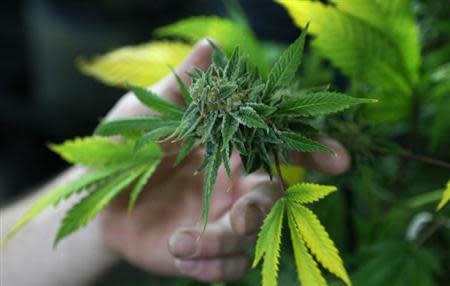U.S. to let banks do business with licensed pot shops

By David Ingram and Jason Lange WASHINGTON (Reuters) - The Obama administration on Friday sought to lessen the fear of prosecution for banks doing business with licensed marijuana companies, further encouraging U.S. states such as Colorado and Washington that are experimenting with legalizing the drug. The Justice and Treasury departments outlined the policy in writing to federal prosecutors and financial institutions nationwide. The guidance stopped short of promising immunity for banks, but made clear that criminal prosecution for money laundering and other crimes was unlikely if they met a series of conditions, officials said. The guidance was intended to increase the availability of banking services, such as savings and checking accounts, to marijuana shops that typically deal in cash. Last month, Colorado became the first state to open retail outlets legally permitted to sell marijuana to adults for recreational purposes, in a system similar to what many states have long had in place for alcohol sales. Washington state is expected to follow Colorado's lead. The number of states approving marijuana for medical purposes has also been growing. California was the first in 1996. It has since been followed by about 20 other states and the District of Columbia. U.S. Attorney General Eric Holder said last month that the administration was planning ways to accommodate marijuana businesses so they would not always be dealing in cash. "There's a public safety component to this. Huge amounts of cash, substantial amounts of cash just kind of lying around with no place for it to be appropriately deposited, is something that would worry me just from a law enforcement perspective," Holder said on January 23 at an appearance at the University of Virginia. The American Bankers Association expressed skepticism that the guidance would make much difference. Marijuana sales still violate federal law, so banks are still at risk, said Rob Rowe, a lawyer with the trade group. "Compliance by a bank will still require extensive resources to monitor any of these businesses, and it's unlikely the benefits would exceed the costs," Rowe said in an email to Reuters. "While we greatly appreciate the efforts by the Department of Justice and FinCEN, guidance or regulation doesn't alter the underlying challenge for banks." TWO MEMORANDA In August, the Justice Department said it would refocus marijuana enforcement nationwide by bringing charges only in eight defined areas, such as shops that sell to minors or are fronts for criminal organizations. The shift gave leeway to users, growers and sellers that feared prosecution. The latest guidance follows the same model, according to a memorandum that Deputy Attorney General James Cole sent to federal prosecutors. Prosecution of a bank might be appropriate if the bank does business with a marijuana shop that it knows is simply a front for a criminal organization, or if the bank or an employee is "willfully blind to such activity," Cole wrote. A separate memorandum from the Treasury Department's Financial Crimes Enforcement Network (FinCEN) laid out the due diligence that banks should carry out, both before working with a marijuana business and during the relationship. Financial companies should verify state licenses, understand the normal activity for the business and monitor for suspicious activity, the memo said. "Now that some states have elected to legalize and regulate the marijuana trade, FinCEN seeks to move from the shadows the historically covert financial operations of marijuana businesses," FinCEN Director Jennifer Shasky Calvery said in a statement. FinCEN, which investigates financial crimes, expects big banks will still be wary about holding the money of pot companies with state licenses, said a senior official at the agency. Still, after consulting with state banking regulators, particularly those in Colorado and Washington, federal authorities said they think the new guidance will get more marijuana money into the banking system. Banks getting involved would be "probably some of the smaller or medium banks rather than some of the largest ones in this country," a FinCEN official said, adding that some banks were already in the practice of flagging money from marijuana businesses in their filings with regulators. "The amount of money in this business is significant," the official said. STILL PRESSING FOR CHANGES Advocates for the marijuana industry said they would continue to press Congress for changes in federal law that would offer more reassurance and that would survive beyond the Obama administration. President Barack Obama is scheduled to leave office in January 2017. "Congress must act quickly to solve the problem before we witness a tragedy," Michael Elliott, executive director of the Marijuana Industry Group, which represents pot retailers in Colorado, said in a statement. The guidance would not protect banks from state laws, and if a wire transfer that moved marijuana-linked money touched a state where the drug is under strict control, a bank that handled the transfer could be open to state prosecution, experts in money-laundering said. Individual banks may have difficulty identifying which state-licensed businesses would run afoul of the federal guidance, said Peter Djinis, a former regulatory policy official with FinCEN, now in private practice in Florida. "These complicated and vague policies continue the uncertainty that banks have in determining whether to take the risk of conducting financial transactions with otherwise legitimate marijuana businesses," Djinis said. (Additional reporting by Aruna Viswanatha, Steve Gorman and Brett Wolf; Editing by Howard Goller, Jan Paschal and Jonathan Oatis)

